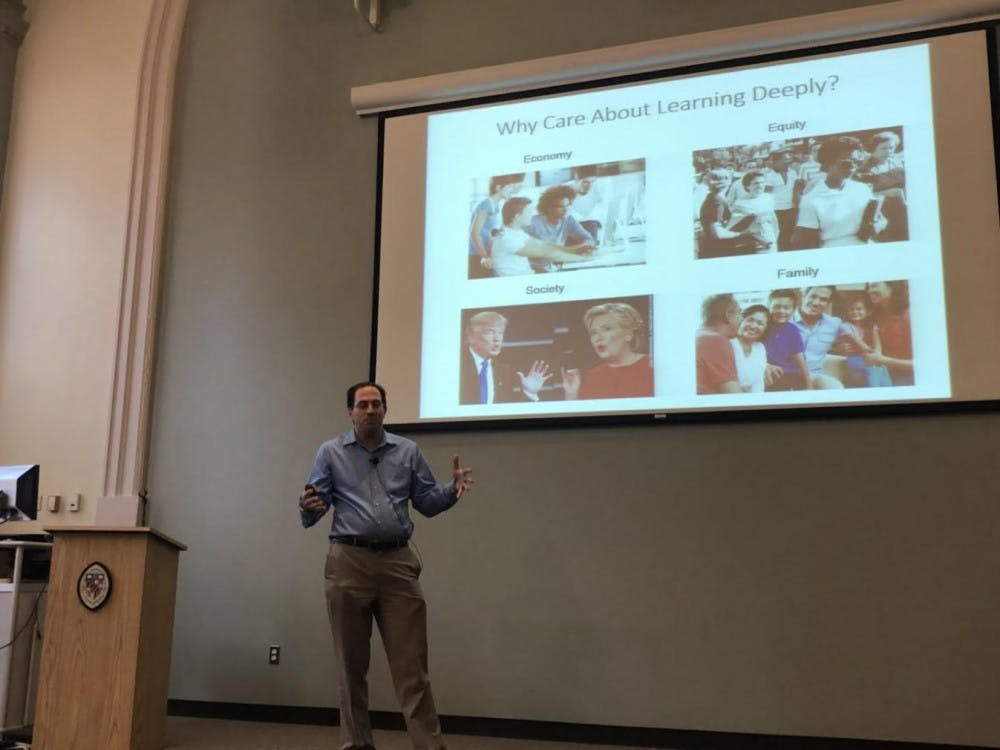Schoolhouse Talk, a speaker series organized by graduate students at the School of Education, welcomed Jal Mehta, associate professor at the Harvard Graduate School of Education, for a talk on Wednesday. During the talk, titled “The Elusive Quest for Ambitious Schooling: Limits and Possibilities of the American High School,” Mehta reported on his book-length research on fostering “deeper learning” in American public schools.
For his study, Mehta and his colleague conducted 300 interviews at 27 different public schools across the country, including magnet schools and International Baccalaureate schools.
Mehta also explained his research methods.
“Our method is ethnographic,” he said. “Generally we will go to a school and ask to shadow a student for a day. We will pick students from different tracks and at different parts of the building. By following students around, we try to get a sense of the various distributions of instruction.”
Mehta broke the motivation behind studying “deeper learning” into four changing factors: economy, equity, society and family.
“Previously you could graduate with a degree and get a middle-class job. When asked about the top three skills of [recent graduates], U.S. employers of the 1970s would say, ‘reading, writing and arithmetic.’ But today their answers will be problem finding, collaboration, critical thinking,” he said.
As for the societal rationale, Mehta discussed the importance of civic engagement and critical thinking.
“Young people of today will become voters in elections, trying to discern real news from fake news and making decisions on global poverty and climate change,” he said. “So their ability to reason about those things and see below the surface is at stake.”
Based on Mehta’s surveys, only one out of five classrooms he has visited managed to “learn deeply,” which he further defined as expanding the students’ capacity for creativity and real-world applications instead of mere memorization.
“About 75 percent of fifth graders reported being engaged in school, and by senior year, this number dropped to 35 percent,” he said.
Mehta compared his observations of students’ interactions within a high school English classroom to those of an after-school theater group. Mehta described the typical classroom setting as “the Core” and any type of extracurricular involvement, like the theater group, as “the Periphery”.
According to Mehta, the Periphery is often more vital than the Core, for the former encourages a more active, deeper learning process. He attributed this phenomenon to the Periphery’s emphasis on community building, interdependent roles and apprenticeship learning.
“If the curriculum of a class focuses on individual production, with the students trying to please the teacher, the hidden curriculum of [theater production] resembles a modern social organization, wherein you have to maintain delicate negotiations among the actors, the company and the technology crew,” he said.
Despite this discrepancy between the Core and the Periphery, Mehta pointed out some developments that offer hope. First, while schools were more inconsistent than they appeared, there was some ambitious teaching in almost every school. Many disciplinary classes often took on some of the same qualities as electives and extracurriculars, which Mehta has shown to be good platforms for deeper learning.
Mehta recommended that public U.S. high schools create learning environments that value identity, creativity, discipline and feedback. Moreover, he reiterated the significance of “peripheral” spaces and the necessity for core disciplinary teachers to engender similar environments in classrooms.
Erwin Hesse, a doctoral student at the Hopkins School of Education, felt that the meaning of “deeper learning” could be elaborated on further.
“I agree with most of what [Mehta] was saying,” he said. “But I want to know how to pinpoint when deeper learning has taken place. That’s when we start to know what to measure because one’s perception of deeper learning may not be accurate to the student’s definition.”
Gilda Hogan, an alumna of the University, who has over 30 years of teaching experience, attended Mehta’s talk to learn more on the state of schools today.
“I came to see exactly what was going on the world of education,” she said. “As a former teacher at various levels, I had wonderful experiences and some not so wonderful. I thought that it would be nice to go out and take a look. Today I heard some fantastic questions and great answers, and it’s just a wonderful time to be alive.”





